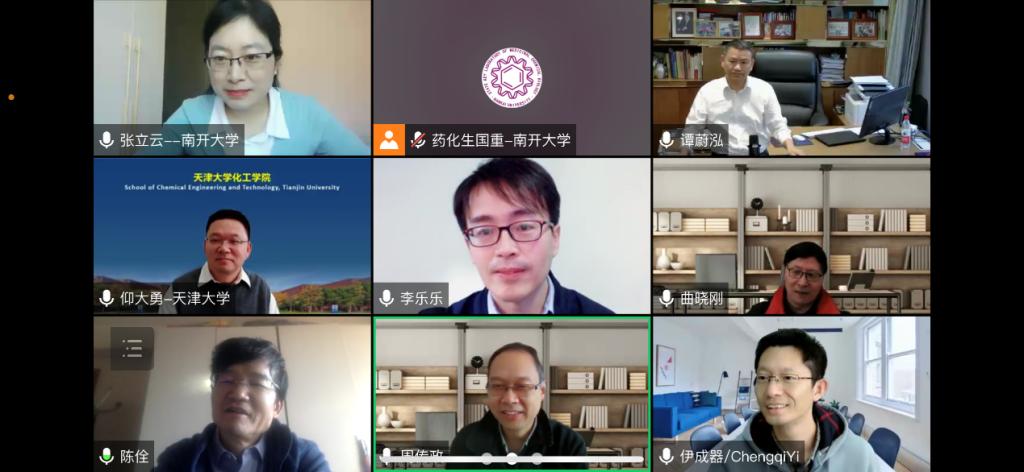On the morning of November 15, 2022, the State Key Laboratory of Medicinal Chemical Biology held the Seventh Forum on Frontiers in Chemical Biology online. Academician Tan Weihong from the Chinese Academy of Sciences and Qu Xiaogang, a researcher from the State Key Laboratory/Chemical Biology Lab of Utilization of Rare Earth Resources, CIAC, CAS were invited to give reports. Hosted by Zhang Liyun, a researcher in the State Key Laboratory of Medicinal Chemical Biology, the forum also invited Professor Yi Chengqi from Peking University, researcher Li Lele from National Center for Nanoscience and Technology, CAS, Professor Yang Dayong from Tianjin University and Professor Zhou Chuanzheng from Nankai University to participate in the discussion. Around 500 teachers and students attended the forum. Meanwhile, it was broadcast live via researchcloud to the public and viewed by a total of 27,000 people.

Chen Quan, director of the State Key Laboratory of Medicinal Chemical Biology, extended a warm welcome to the experts and audience members. He said that the chemical biology forum aims to invite top scientists to guide young PIs and students in the laboratory, grasp the hot topics at the frontiers of international science, and promote scientific research development and academic exchange. To date, seven sessions of the forum have been held. It is planned to continue holding the forum in the future and shape it into a brand academic activity of the key laboratory.

The report by academician Tan Weihong was entitled “Protein Molecular Map of Single Cancer Cells”. He introduced how to realize high throughput characterization of single cell surface proteins and transform the huge capacity of high throughput gene sequencing into cognitive ability of cell membrane surface protein molecules through aptamers. Academician Tan noted that today, when molecular medicine is booming, we should learn the process and mechanism of disease occurrence and development, diagnose diseases early and accurately, treat diseases and guide rehabilitation accurately, and prevent and predict diseases at the molecular level. He also noted that we should treat life, cure diseases and maintain health from the molecular aspect; we should explore molecular mechanisms, create molecular tools and benefit human health using molecular medicine to create a “Healthy China” . After the report, the guests had a lively discussion with academician Tan on high throughput screening of aptamers, homeostasis maintenance in vivo, targeted therapy, and development of new disease markers.

The report from researcher Qu Xiaogang was entitled “Biomimetic Catalysis and Biomedical Application of Nanoenzymes”. Qu Xiaogang introduced the advantages and broad-based application scenarios of nanoenzymes. He explained the research group's design of multi nanometer enzyme cascade catalytic systems to solve issues with compatibility of various nanoenzymes; in-depth research of biomimetic catalytic systems and catalytic mechanisms of nanoenzymes; the application of nanoenzymes in multiple aspects such as anti-inflammation, anti-tumor, anti-bacterial, and disease diagnosis to steadily realize the regulation of activity in single living cells. After the reports, the audience members enjoyed an in-depth discussion with Qu Xiaogang and explored potential avenues of cooperation to realize intelligent medicine using nanoenzymes.
Expert introduction:
Tan Weihong is a molecular medicine specialist, academician of Chinese Academy of Sciences, and academician of the World Academy of Sciences. He is also President of the Institute of Molecular Medicine (IMM), Shanghai Jiao Tong University, professor at Hunan University, founding director of the Institute of Basic Medicine and Cancer, CAS, and chairman of the Molecular Medicine Specialty Committee, Chinese Chemical Society. Academician Tan has long engaged in frontier research and clinical applications of bioanalytical chemistry, chemical biology and molecular medicine. He proposed new principles and methods in a series of nucleic acid chemistry and biomedical applications and has published nearly 900 academic papers in academic journals such as Science, with a H-index of 158. From 2014 to 2021, he was recognized internationally as a “highly cited scholar” for eight consecutive years. Academician Tan has won the Second Prize of National Natural Science twice, won the Science and Technology Awards of the Ho Leung Ho Lee Foundation in 2018, the Analytical Chemistry Award in Spectrochemical Analysis US, and the Achievement Award of Bioanalytical Chemistry.
Qu Xiaogang is a researcher at Changchun Institute of Applied Chemistry, CAS, a distinguished young scholar and doctoral supervisor. He is also a Fellow of the Royal Society of Chemistry; associate editor of journals such as J. Mater. Chem. B and Mater. Adv.; member of the editorial board of journals including Journal of Rare Earths and Applied Chemistry; part-time doctoral supervisor of Jilin University; honorary professor of the University of Queensland; director of the Biophysical Society of China; president of the Nanoenzyme Society; deputy director of the Professional Committee of Biophysical Chemistry, Chinese Chemical Society; committee member of the Professional Committee of Chemical Biology; and director of the Chinese Society of Rare Earths. Qu Xiaogang has long engaged in research in the areas of chemical biology/bioinorganic chemistry and made systematic and innovative achievements in chemically regulated nucleic acid, protein, and cell biological functions. He has published more than 260 papers with a H-index of 105. From 2017 to 2021, recognized internationally as a “highly cited scholar” for five consecutive years.